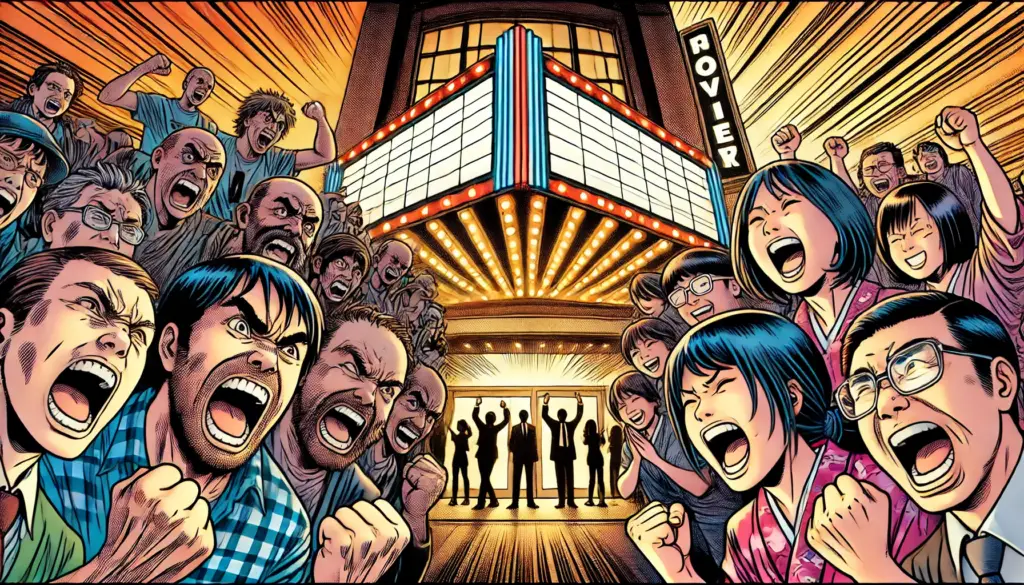
Some films don’t just entertain—they confront society’s deepest taboos, challenge authority, and provoke outrage. Japan, a nation that often values harmony over confrontation, has produced a small but powerful group of films that shook the public and sparked national debates. From anti-war documentaries to political dramas, here are the Japanese films that caused the biggest stir. 🎥🔥
1. Yukiyukite Shingun (ゆきゆきて、神軍, 1987)
Director: Kazuo Hara
Genre: Documentary
Synopsis:
This documentary follows WWII veteran Kenzo Okuzaki as he confronts his former comrades to expose the execution of Japanese soldiers in New Guinea. His intense, sometimes violent confrontations culminate in a powerful critique of Japan’s postwar denial.
Why It Caused Outrage:
- Direct criticism of Emperor Hirohito was considered taboo in Japan.
- Okuzaki’s aggressive tactics (including slapping interviewees) were seen as extreme.
- It sparked intense public debate over wartime accountability.
Legacy:
Banned from many TV networks but celebrated internationally, especially at the Berlin Film Festival.
2. Yasukuni (靖国, 2007)
Director: Li Ying
Genre: Documentary
Synopsis:
This documentary examines the Yasukuni Shrine, a contentious site that enshrines Japan’s war dead, including war criminals. Using a fly-on-the-wall approach, the film lets viewers observe, rather than judge.
Why It Caused Outrage:
- Directed by a Chinese-born filmmaker, raising nationalist suspicions.
- Right-wing activists accused it of being anti-Japanese and staged protests.
- Some theaters canceled screenings due to safety concerns.
Legacy:
Despite controversy, the film was eventually shown in over 60 theaters and watched by over 130,000 people.
3. Caterpillar (キャタピラー, 2010)
Director: Koji Wakamatsu
Genre: War Drama
Synopsis:
A Japanese soldier returns from war as a decorated hero—but without limbs or speech. The story focuses on his psychological deterioration and abusive relationship with his wife, highlighting the absurdity of military glorification.
Why It Caused Outrage:
- Graphic depictions of sex, trauma, and wartime suffering.
- Sharp critique of blind patriotism and military culture.
Legacy:
Lauded abroad (Berlin Film Festival), but met with discomfort among conservative audiences in Japan.
4. Patriotism (憂国, 1966)
Director: Yukio Mishima & Masaki Domoto
Genre: Short Film
Synopsis:
Based on Mishima’s own story, this stylized short depicts a loyal soldier and his wife committing ritual suicide after a failed coup attempt. It reflects Mishima’s nationalist ideology and obsession with honor.
Why It Caused Outrage:
- Romanticized militarism and death for the emperor.
- Mishima’s real-life suicide in 1970 gave the film a chilling prophetic tone.
Legacy:
Withdrawn from circulation for decades, it was later reevaluated as an artistic yet disturbing reflection of political extremism.
5. A.K.A. Serial Killer (略称・連続射殺魔, 1975)
Director: Masao Adachi
Genre: Experimental Documentary
Synopsis:
Instead of focusing on a teen mass murderer’s crimes, this film investigates the environments he lived in—abandoned housing blocks, factory towns, and slums—drawing a Marxist connection between place and violence.
Why It Caused Outrage:
- Radical left-wing message during a time of social unrest.
- Lack of moral condemnation shocked viewers expecting a crime documentary.
Legacy:
Now seen as a landmark in political cinema; it influenced both Japanese and European filmmakers.
6. United Red Army (実録・連合赤軍 あさま山荘への道程, 2007)
Director: Koji Wakamatsu
Genre: Political Drama
Synopsis:
This harrowing film reconstructs the rise and fall of the United Red Army, a far-left terrorist group responsible for a notorious 1972 hostage crisis and brutal internal purges.
Why It Caused Outrage:
- Graphic depictions of torture and ideological fanaticism.
- Showed that extremism wasn’t only a problem on the right, but also on the left.
Legacy:
Critically acclaimed for its raw realism, it remains a cautionary tale about radical politics.
🎬 Why These Films Still Matter
These aren’t just films—they’re cinematic acts of resistance. They dared to:
- Criticize the emperor and national myths
- Confront Japan’s war crimes and colonial legacy
- Challenge censorship and taboos
- Illuminate the dangers of political extremism
In a society that often avoids open conflict, these films serve as rare and courageous reminders that truth-telling can be revolutionary.



















































